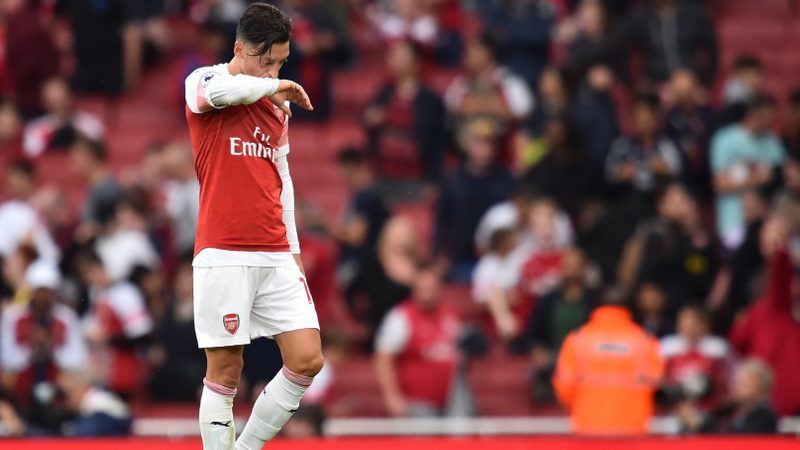
Mesut Ozil's sense of belonging at Arsenal has gone from being an erstwhile midfield genius to now an exiled figure seeking a new scenery. The 2014 World Cup winner is currently in talks with Fenerbahce and DC United to end his eight-year stay in England.
Ozil is inarguably one of his generation’s most extraordinary talents, showcasing glimpses of a prodigious left-footed playmaker at Bundesliga clubs Schalke 04 and Werder Bremen in his early beginnings.
Mesut Ozil’s second season at Bremen served as the first checkpoint of greatness in the Gelsenkirchen-born playmaker’s career. He chalked up 14 assists, led Die Werderaner to the 2009 UEFA Cup and DFB Pokal finals while scoring the latter fixture’s winning goal.
The more significant call in Ozil's early career came in 2010 when Jose Mourinho's Real Madrid brought him on board in a £16.6m deal and a six-year contract. Upon noticing his performances in Germany's run to the final of the 2010 FIFA World Cup, the Portuguese manager ironed out that the then-21-year-old was someone who 'fit his system perfectly.'
The 'Real' breakthrough
Mesut Ozil's three-season spell at Real Madrid was a stepping stone to success, as he registered a splendid 54 assists in 105 career appearances for Los Blancos.

Ozil finished in the top two in La Liga for assists in each of his three Real Madrid seasons, with 19 assists in the 2010-11 and 2011-12 campaigns before bagging 16 in the 2012-13 season.
However, Carlo Ancelotti's arrival in the hot seat spelled an end to his Galactico career, and Ozil, with three titles in his time in Madrid, sent shockwaves to the sporting world with a record £42.4m move to Arsenal on deadline day of the 2013 transfer window.
Ozil's bumpy ride with Arsenal and Germany
Mesut Ozil's arrival at Arsenal drove football fans' excitement to the brim in the Premier League and set an illusionary benchmark for the German playmaker to skyrocket to fame.
The Gunners finished fourth in Ozil's debut campaign, with the German tallying five goals and 10 assists. The year 2014 is unique from his international career point of view. His two assists propelled Germany to a landmark 7-1 win over Brazil in the 2014 FIFA World Cup semi-finals and then lifting football's holy grail at the Maracana.
However, the former Real Madrid playmaker's impact was relatively flat in the 2014-15 season as he couldn't transfigure his form from the World Cup-winning campaign.
100 – Since his move to Real Madrid for the beginning of the 2010-11 season, @MesutOzil1088 is one of only five players within Europe’s top five leagues to record at least 100 league assists (47 for Real Madrid, 54 for @Arsenal). Longing. pic.twitter.com/kSdmCUPXgD
— OptaJoe (@OptaJoe) October 15, 2020
The 2015-16 campaign is, by far, Mesut Ozil’s best-ever in the Premier League. The playmaker registered 19 assists, including a record streak of assists in seven consecutive matches. Ozil finished with the most assists in the 2015-16 season and became the first footballer to register most assists in a single campaign in England, Spain (2011-12), and Germany (2009-10).

Since notching ten league assists in the 2016-17 Premier League campaign, Ozil’s output levels saw a drop, and thus, the tale of his eventual downfall from grace began.
10 - Mesut Ozil is the first player to assist 10+ goals in his first 11 appearances of a PL season. Form. @MesutOzilStats
— OptaJoe (@OptaJoe) November 8, 2015
2018 - Where all troubles began
Mesut Ozil hit a new low in 2018, as Arsene Wenger’s departure significantly impacted his performance under new head coach Unai Emery. The club awarded him a three-year contract to tie him down until the summer of 2021, and this news didn’t sit well with the club faithful mainly down to the fact that his wages rose significantly to £350,000. The German, till date, remains the highest earner at Arsenal despite not being registered in the club’s Premier League squad for the 2020-21 season.
Ozil’s last international assignment was the 2018 FIFA World Cup in Russia, where he received racist jibes not only for the controversial meeting with Turkish President Recep Tayyip Erdoğan but also for his performances, which led to Germany’s pre-mature exit.
Shortly after, the Arsenal playmaker announced his retirement from the international circuit and accused then DFB President Reinhard Grindel of racism, stating that, “In the eyes of Grindel and his supporters, I am German when we win, but I am an immigrant when we lose.”
What led to Mesut Ozil’s downfall?
Mesut Ozil, now in his thirties, is a far cry from the demeanour he portrayed between 2009 and 2017. A change in management and the rise of new talents have left little room for the 32-year-old to feature in the playing XI.
The biggest shocker came when Arsenal decided to drop Ozil from their Premier League squad, and the former Germany superstar took to social media to express his disappointment.
〽️⚽️ #M1Ö #YaGunnersYa pic.twitter.com/hF7abGklOT
— Mesut Özil (@MesutOzil1088) October 21, 2020
Coming to Arsenal after being an understudy to Pep Guardiola at Manchester City, Mikel Arteta’s philosophy is a drastic contrast from that of Wenger. And his demand for relentless pressing in the opponents’ half, which has been a quintessential aspect of modern football, is understandable.
Ozil is no more an elite footballer like Lionel Messi and Cristiano Ronaldo, who would continue to get selected based solely on their uniqueness and not work-rate. Arsenal’s necessity to get results without much financial backing is also a big reason for Arsenal’s style of football.
Arsenal no longer have the likes of Santi Cazorla and Tomas Rosicky. Their understanding of spaces, off the ball work-rate, and silky footwork in the midfield allowed Ozil to wander in the final third with the sole job of creating chances.
Arteta’s Arsenal put equal stress on every player back-tracking once they lose the ball - something an ageing Ozil cannot execute day in and day out. Then there are non-footballing reasons as well.
Amid reports that it was due to pay cut issues that Mesut Ozil was dropped from Arsenal’s Premier League roster in August, current head coach Mikel Arteta asserted that Ozil’s omission is solely down to ‘footballing reasons.’
While Ozil is approaching the end of his journey in English football, one can merely fathom how a player, who has tallied 132 assists in 390 league games, has fallen from grace at a speed that is highly uncounted. The German has not stepped onto the football pitch in 308 days and is one of the last few natural No.10s to still be active in the game.
Most league assists in Europe's top five divisions since 2006-07:
⬡ Lionel Messi
⬡ Cesc Fàbregas
⬢ Mesut ÖzilPure silk. pic.twitter.com/B6SAqPflZl
— Squawka Football (@Squawka) October 15, 2020
Premier League and Arsenal will both lose a once-in-a-lifetime genius when Ozil leaves North London, for as Arsene Wenger had once rightly said, “... If you love to watch football, you love to watch Ozil.”




















